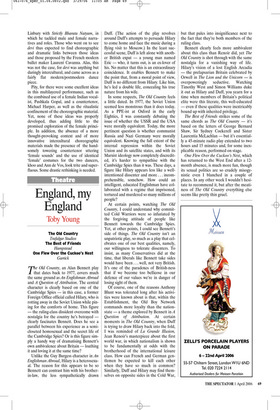England, my England
Toby Young
The Old Country Trafalgar Studios The Best of Friends Hampstead One Flew Over the Cuckoo’s Nest Garrick The Old Country, an Alan Bennett play that dates back to 1977, covers much the same ground as An Englishman Abroad and A Question of Attribution. The central character is clearly based on one of the Cambridge Spies — in this case, a former Foreign Office official called Hilary, who is rotting away in the Soviet Union while pining for the comforts of home. This figure — the ruling-class dissident overcome with nostalgia for the country he’s betrayed clearly fascinates Bennett. Does he see a parallel between his experience as a semicloseted homosexual and the secret life of the Cambridge Spies? Or is this figure simply a handy way of dramatising Bennett’s own ambivalence about Britain — loathing it and loving it at the same time?
Unlike the Guy Burgess character in An Englishman Abroad, Hilary is a heterosexual. The reason for this appears to be so Bennett can contrast him with his brotherin-law, the less sympathetically drawn Duff. (The action of the play revolves around Duff’s attempts to persuade Hilary to come home and face the music during a flying visit to Moscow.) In the least successful scene, Duff is left alone with another British expat — a young man named Eric — who, it turns out, is an ex-lover of his. No matter that this is an extraordinary coincidence. It enables Bennett to make the point that, from a moral point of view, Duff is no different from Hilary. Like him, he’s led a double life, concealing his true nature from his wife.
In some respects, The Old Country feels a little dated. In 1977, the Soviet Union seemed less monstrous than it does today. As a PPE-ist at Oxford in the early Eighties, I was constantly debating the issue of whether the USSR and the USA were morally equivalent. Today, the more pertinent question is whether communist Russia and Nazi Germany were morally equivalent. Knowing the full extent of the internal repression within the Soviet Union and its satellite states, and with its Marxist ideology now completely discredited, it’s harder to sympathise with the Cambridge Spies than it was. These days, a figure like Hilary appears less like a wellintentioned dissenter and more ... incomprehensible, somehow. How could an intelligent, educated Englishman have collaborated with a regime that imprisoned, tortured and murdered so many millions of people?
At certain points, watching The Old Country, I could understand why committed Cold Warriors were so infuriated by the forgiving attitude of people like Bennett towards the Cambridge Spies. Yet, at other points, I could see Bennett’s side of things. The Old Country isn’t an unpatriotic play, so much as a play that celebrates one of our best qualities, namely, our willingness to tolerate dissenters. To insist, as many Conservatives did at the time, that liberals like Bennett take sides would have been ... well, not very British. It’s one of the paradoxes of British-ness that if we become too bellicose in our defence of our values we’re in danger of losing sight of them.
Of course, one of the reasons Anthony Blunt was tolerated long after his activities were known about is that, within the Establishment, the Old Boy Network commands more loyalty than the nationstate — a theme explored by Bennett in A Question of Attribution. At certain moments in The Old Country, when Duff is trying to draw Hilary back into the fold, I was reminded of La Grande Illusion, Jean Renoir’s masterpiece about the first world war, in which nationalism is shown to be fundamentally at odds with the brotherhood of the international leisure class. How can French and German gentlemen be expected to kill each other when they have so much in common? Similarly, Duff and Hilary may find themselves on opposite sides in the Cold War, but that pales into insignificance next to the fact that they’re both members of the ruling class.
Bennett clearly feels more ambivalent about this class than Renoir did, yet The Old Country is shot through with the same nostalgia for a vanishing way of life. Hilary’s vision of a lost English Arcadia — the prelapsarian Britain celebrated by Orwell in The Lion and the Unicorn — is overpoweringly seductive. Watching Timothy West and Simon Williams duke it out as Hilary and Duff, you yearn for a time when members of Britain’s political elite were this literate, this well-educated — even if these qualities were inextricably bound up with inherited privilege.
The Best of Friends strikes some of the same chords as The Old Country — it’s based on the letters of George Bernard Shaw, Sir Sydney Cockerell and Sister Laurentia McLachlan — but it’s essentially a 45-minute radio play extended to two hours and 15 minutes and, for some inexplicable reason, performed on stage.
One Flew Over the Cuckoo’s Nest, which has returned to the West End after a 12month absence, is much more fun, though its sexual politics are so crudely misogynistic even I blanched in a couple of places. In any other week I wouldn’t hesitate to recommend it, but after the meatiness of The Old Country everything else seems like pretty thin gruel.


























































































 Previous page
Previous page